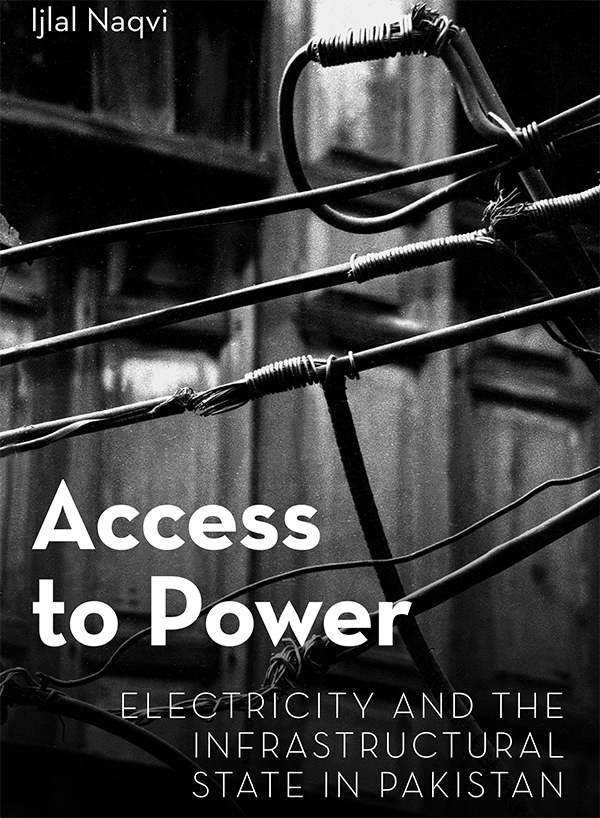| |
 |
| |
Pakistan would desperately like to produce enough electricity, but it usually doesn't. Despite prioritization by successive governments, targeted reforms shaped by international development actors, and featuring prominently in Chinese Belt and Road investments, the Pakistani power sector continues to stifle economic and social life across the country. Why?
In Access to Power, Ijlal Naqvi explores state capacity in Pakistan by following the material infrastructure of electricity across the provinces and down into cities and homes. Naqvi argues that the national-level challenges of crippling budgetary constraints and power shortages directly result from conscious strategic decisions that are integral to Pakistan's infrastructural state. As he shows, electricity governance in Pakistan reinforces unequal relations of power between provinces and the federal center, contributes to the marginalization of subordinate groups in the city, and cements the patronage-based relationships between Pakistani citizens and the state that have been so detrimental to development progress.
Looking through the lens of the electrical power sector, Access to Power reveals how Pakistan actually works, and to whose benefit.
Please refer to the attached flyer for details to purchase the book.
|
|
| |
| |
 |
20 JANUARY 2023
FRIDAY
3.30PM - 5.30PM
|
 |
SMU Yong Pung How
School of Law
Function Lounge, Level 4
55 Armenian Street
Singapore 179943
|
|
|
|
| |
| |
 |
OPENING ADDRESS
Chandran Kukathas
Dean, School of Social Sciences, SMU
Lee Kong Chian Chair Professor of Political Science
Professor Chandran Kukathas is Dean and Lee Kong Chian Chair Professor of Political Science at School of Social Sciences, Singapore Management University. He was Head, Department of Government at the London School of Economics and Political Science (LSE) from 2015 to 2019. He also served as the Chair of Political Theory in the Department of Government and as Warden of High Holborn and Grosvenor House Halls of Residence at LSE. Before his appointment at LSE, Chandran was Neal A. Maxwell Professor of Political Theory, Public Policy and Public Service at the University of Utah and has taught at the University of New South Wales, Oxford University and the Australian National University. He completed his Bachelor of Arts in History and Political Science at the Australian National University and his Master of Arts in Politics at the University of New South Wales before going on to complete his Doctor of Philosophy in Politics at Oxford University.
|
|
| |
| |
 |
AUTHOR
Ijlal Naqvi
Associate Professor of Sociology, School of Social Sciences, SMU
Associate Dean (Curriculum and Teaching)
Ijlal Naqvi is Associate Professor of Sociology at Singapore Management University. He studies governance and development in the global south, using infrastructure as a lens on state-building and the citizen’s engagement with the state on an everyday basis. His first book, Access to Power: Electricity and the Infrastructural State in Pakistan, was recently published by Oxford University Press.
|
|
| |
| |
|
PANELISTS
|
|
| |
|
|
|
| |
 |
Dean Dulay
Assistant Professor of Political Science, School of Social Sciences
SMU
Dean Dulay is Assistant Professor of Political Science at Singapore Management University. His main areas of specialisation are Political Economy of Development and Historical Political Economy. His research is published or forthcoming in outlets such as The Journal of Politics, Comparative Political Studies, The Journal of Public Economics, and the Journal of East Asian Studies.
|
|
| |
|
|
|
| |
 |
Forrest Zhang
Associate Professor of Sociology, School of Social Sciences, SMU
Associate Dean (Research)
Qian Forrest Zhang is Associate Professor of Sociology and the Associate Dean for Research at the School of Social Sciences. His research focuses on China’s agrarian political economy and rural development but extends to a range of other issues in contemporary China, including self-employment, stratification and inequality, social mobility, and family relations. His recent works have investigated agricultural cooperatives, industrial pig farming, the agrarian capitalist class, and land politics. He is the recipient of the 2015 Bernstein & Byres Prize in agrarian change.
|
|
| |
|
|
|
| |
 |
Marina Zaloznaya
Associate Professor of Sociology and Political Science, University of Iowa
Director of the European Studies Group
Marina Zaloznaya is Associate Professor of Sociology and Political Science, the Director of the European Studies Group at the University of Iowa, and the co-founder of the Corruption in the Global South Research Consortium. Dr. Zaloznaya joined Iowa faculty in 2012, after receiving a Master’s degree from the University of Wisconsin-Madison and a PhD in Sociology from Northwestern University. Dr. Zaloznaya’s research explores public sector corruption, political behavior, and gender in post-Socialist contexts from a range of methodological perspectives, including ethnography, survey methods, comparative-historical, and network analysis. Her first book, The Politics of Bureaucratic Corruption in Post-Transitional Eastern Europe, focused on bribery and nepotism in universities of Ukraine and Belarus, and was published by Cambridge University Press in 2017. For another project, funded by two grants from the US Department of Defense, Dr. Zaloznaya and her collaborators carried out a series of national representative surveys in Russia, China, Ukraine, and Georgia, which they used to analyze individual-level causes and gendered patterns of public sector corruption, its impact on citizens’ political views and behaviors, and its embeddedness in citizens’ social networks. Results of these analyses have appeared in a range of top sociology, political science, and area studies journals, such as Social Forces, Electoral Studies, Post-Soviet Affairs, Law & Social Inquiry, and many others.
|
|
| |
| Register Now |
| |
|
Remarks: Light refreshments will be provided.
|
|
|